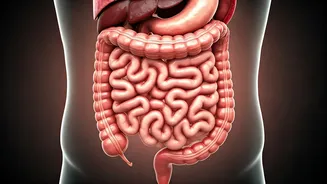Caffeine's Common Role
Caffeine is frequently used by individuals to initiate or stimulate bowel movements. This practice, while seemingly effective in the short term, is not
without its risks. The stimulation provided by caffeine bypasses the body's natural processes, potentially disrupting the gastrointestinal system's ability to function correctly. This is because the colon can become dependent on caffeine's stimulant effect to initiate bowel activity, making the body less efficient at this function when caffeine is not used. Over time, the body’s natural ability to regulate bowel movements can diminish due to the repeated chemical stimulation.
Disrupting Natural Rhythms
The consistent use of caffeine for bowel stimulation disrupts the body's natural circadian rhythms. The body relies on internal signals and processes to regulate digestive functions. By relying on caffeine, these natural signals become less effective. The digestive system’s muscles and nerves that would usually initiate the process may become less responsive without the presence of the stimulant. This reliance can lead to constipation or a decreased ability to have a bowel movement when caffeine is not consumed. The body starts to expect the stimulant rather than respond to internal cues, making it a form of dependence.
Gut Health Risks
Regular consumption of caffeine can negatively impact the delicate balance of gut health. Caffeine can increase the activity of the gut, which may increase the urgency for bowel movements. However, this also interferes with the absorption of essential nutrients. Some studies indicate that chronic caffeine use can exacerbate existing digestive issues such as irritable bowel syndrome (IBS) or increase the risk of developing new ones. Furthermore, relying on caffeine does not address the underlying causes of digestive problems. Addressing these root causes may lead to better long-term gut health.
Healthy Alternatives
Instead of using caffeine, there are healthier approaches to encourage bowel movements. Increasing dietary fiber intake through fruits, vegetables, and whole grains can promote regular and natural bowel activity. Adequate hydration is also crucial, as water softens stools and makes them easier to pass. Regular physical exercise can help to stimulate intestinal function, enhancing the efficiency of digestion. By incorporating these strategies, individuals can support their digestive health more effectively, without developing a dependence on stimulants.




















